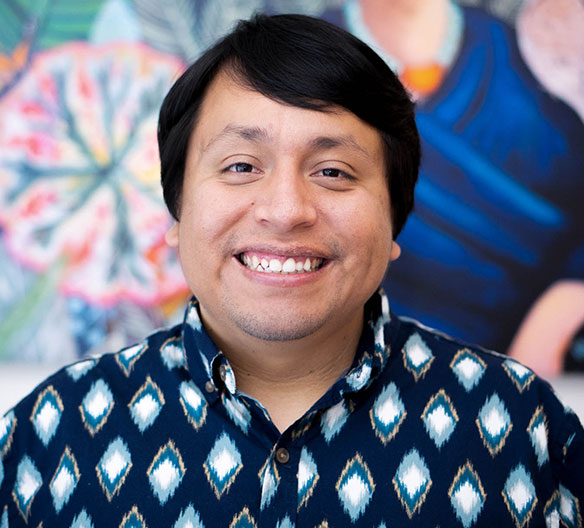What do you want to learn more about?
Pride month: Interview with Luis Cornejo, a Licensed Marriage & Family Therapist

This week, I had the pleasure of interviewing Luis Cornejo, LMFT who is the founder of PsychoSocial, a multimedia platform that strives to highlight issues impacting the LGBTQ, POC, and other disenfranchised groups.
Please tell us a bit about yourself
My name is Luis Cornejo and I am a Licensed Marriage & Family Therapist who graduated from Long Beach State University with a Master’s degree in Counseling Psychology (2015). I also received a Bachelor’s degree in Child and Adolescent Development with an emphasis in Public Policy from San Francisco State University (2011).
I have over 9 years of experience working with children and families both in education and mental health. In the past, I have also worked for non-profit agencies in both San Francisco and Los Angeles as a mental health provider and mental health consultant. Currently, I am working for Kaiser Permanente as part of the Integrated Behavioral Health Department in San Francisco. My therapeutic interests include working with Trauma, the LGBTQ community, Children, Families, Depression, Anxiety, and POC.
My interests include; Films, Reading, Writing, Art, Travelling, Disney, and Food. I am also a recipient of the California State Stipend award (2015). An award for recently graduated mental health professionals dedicated to serving underrepresented communities. PsychoSocial is part of my dedication to mental health and an example of my passion to educate others. I hope that through PsychoSocial I will be able to help in the fight to end the stigma around mental illness. #EndtheStigma
What struggles and strengths do you think are unique to the LGBT immigrant community?
From my work with the LGBTQ+ immigrant community, I have noticed a few patterns and commonalities that often set them apart from the rest of the LGBTQ+ community. This includes immigrating from countries that have high violence and discrimination rates for LGBTQ+ people.
Many of LGBTQ+ immigrants experience high levels of trauma not only because of their identity and being discriminated but also from having to leave their homeland and come to a new place that is not always welcoming. Traveling between countries and across borders can be full of dangers, and many people experience extreme hardships. Then after arriving at their destination, they have to go through culture shock. Many struggle with the language, accessing resources, finances, trauma, ICE, and on top of that continuing to struggle with their identity.
Many of the individuals I’ve worked with shared stories about discrimination in the U.S, not only as LGBTQ+ individuals but also because of their immigration status. Many of my client’s expressed fear and shame about speaking up. I would often hear my clients justify that it was a small price to pay for being in a “better” situation than they were back home.
Religion was also another huge part of the experience and the internalized shame clients often had. There were many moments where many of them would have conflicting views and misinformation about their identity. For example, I had clients who often believed their sexual role as gay males was correlated with gender and I would hear comments like “Pues yo no soy Mujer para dejarme tocar de esa manera” translated “Well I’m not a woman to let myself be touched that way” often referring to being a bottom or the “passive” sexual role in gay relationships. This may seem simple, but it brought up a lot of shame about being too “feminine” and making their families embarrassed.
The most common thing I often heard, however, which was difficult for me as a gay man, was hearing about how common child sexual abuse was for my client within their family system. Many of them justified being gay or transgender due to this, so they felt forced or “converted.”
Regardless of all of these struggles, however, I also saw their strength, resilience, desire for freedom, love for life, and humor. Many of the individuals I worked with were talented, passionate, and motivated. Even through all their struggles, pain, rejection, and confusion, they believed in something better. I had the honor of hearing their stories, laughing, crying, and witnessing their authenticity.
One thing I have noticed among many of my LGBT clients seeking asylum is that they are incredibly grateful to be in the USA where they feel safe. But at the same, they are willing to accept microaggressions and other forms of discrimination because “at least they’re not trying to kill me.” What would you say to clients like this?
This is a challenging question and this type of situation was quite common in my work. My first reaction internally was always anger. Knowing my clients in a deeper sense than most people, I felt angry, sad, frustrated, and scared for their situations.
A huge part of my work was supporting my clients in finding their power. Focusing on advocacy and empowering them to speak up. My main objective was always to have empathy and understanding the situations they escaped back in their homeland, but also reminding them that they are worthy, valid, and deserving of respect. Working with LGBTQ+ immigrant clients was not always as simple as providing therapy, it included helping them access resources, finding support, and creating safety plans.
What are some clinical considerations that mental health clinicians should keep in mind when working with the LGBT immigrant community?
Education. I won’t say it’s the only or sure-fire way to be proficient, however, it’s a start. Understanding the unique issues that affect these individuals not just LGBTQ+, but also as immigrants.
The other is not assuming, making sure that they listen. As clinicians, we have the knowledge and sometimes it’s helpful, but the client will always know more about their specific situation. This does not mean that we should expect the clients to educate us on LGBTQ+ issues, but that we should listen to how their experiences are similar or differ as well as what the client needs.
Respecting client’s choices in their identity and expression is another huge one. It is not our responsibility to tell or assume how patients experience their identity, our role is to facilitate and support the client in healing.
The final thing is knowing your resources. Research opportunities, programs, and support for clients. This can make a huge difference and build trust within the therapeutic relationship. Many of my past clients had various needs when it came to immigration, legal issues, financial difficulties, health, and other areas.
Please tell us about PsychoSocial and why you created it?
PsychoSocial is a multimedia platform founded by Luis Cornejo, LMFT, and Co-Founded by Katherine Dominguez, ASW. PsychoSocial is designed to promote mental health awareness, knowledge, and advocacy as well as fight to de-stigmatize mental illness. Through the use of written text, video, social media, and audio, PsychoSocial hopes to create dialogue and support for mental health awareness.
PsychoSocial strives to highlight issues impacting the LGBTQ, POC, and other disenfranchised groups. PsychoSocial is also dedicated to highlighting an array of topics impacting mental health which includes creativity, culture, and current events.
As such, we conduct interviews and coverage on individuals who are creating movements and awareness through art, media, and other creative means. In the past, we have interviewed and collaborated with Antonio Castellanos, the creator of Joteria, a twist on the traditional Mexican game of Loteria. We have also interviewed Armando Ibanez the director, writer, and star of youtube based series Undocumented Tales, which explores the life of an undocumented gay man working as a waiter in the United States.
If people want to learn more about you and your work, where can they find you?
People can find out more about me on www.psychosocial.media or by visiting PsychoSocial’s Instagram account @psychosocial_media

I’m Cecilia Racine, and I teach therapists how to help immigrants through my online courses. As a bilingual immigrant myself, I know the unique perspective that these clients are experiencing. I’ve conducted over 300 evaluations and work with dozens of lawyers in the various states. Immigrants are my passion, I believe they add to the fabric of our country.
related articles
5 Children’s Books on Immigration
Whether it’s a time marked by nerves or excitement, the process of moving to a…
What Immigration Lawyers do, When you Might Need One, and How to Find One
When we think about one of the most bashed professions, lawyers certainly take the cake.…
6 Essential Tools for Immigration Evaluation Therapists
Every day, innovative new products and tools are changing the way helping professionals conduct their…



